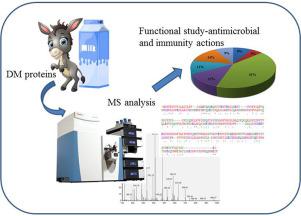Journal of Proteomics ( IF 3.3 ) Pub Date : 2020-10-08 , DOI: 10.1016/j.jprot.2020.104007 Valentina Spada 1 , Pasquale Ferranti 2 , Lina Chianese 2 , Elisabetta Salimei 3 , Francesco Addeo 2 , Gianluca Picariello 1

|
Donkey's milk (DM) has been extensively investigated as a valuable substitute of breast milk, often suitable to manage cow's milk protein allergy in infants. DM exhibits potent inhibitory properties against numerous microbial species. Although oligosaccharides and lipids might contribute to the antimicrobial potential, the current inventory of proteins is not able to justify the low count of microorganisms generally observed in DM.
The shotgun proteomic analysis of fractionated DM disclosed a set of 94 gene products, 41% of which have documented antimicrobial activity or are involved in transferring the passive immunity to the donkey offspring. The concerted action of lysozyme, lactoferrin, immunoglobulins provides the molecular basis for part of the DM antibacterial potential. The pH -4.6 insoluble fraction contained significant levels of L-amino acid oxidase, identified with 11 unique peptides matching the horse homologue gene product. This enzyme catalyses the oxidative deamination of amino acids into ketoacids, producing ammonia and H2O2. κ-casein, likely occurring as a fully O-glycosylated protein, may concur to inhibit the adhesion of pathogenic microorganisms, along with other glycoproteins.
Proteomics supports the alimentary use of DM not only as a substitute of human milk in early infancy, but also for growing children, convalescent, elderly people and general population.
Significance
Donkey's milk (DM) is acquiring increasing popularity because it is a suitable substitute of the human milk, when breastfeeding is not possible and infants suffer from cow's milk allergy.
DM is characterized by a much lower microbial load compared to ruminants' milk. This feature has been traditionally attributed to the high content of lysozyme. DM exhibits potent activity against a broad range of bacteria, viruses and fungi, suggesting that other protein components can be responsible of the antimicrobial potential. The gel-free proteomic analysis of pH 4.6-insoluble and soluble (whey) fractions demonstrated that DM contains a large number of gene products involved in antimicrobial mechanisms and in transferring passive immunity to the donkey offspring.
DM contains relatively high levels of L-amino acid oxidase that catalyses the oxidative deamination of amino acid substrates into ketoacids, with production of ammonia and H2O2. In combination with lysozyme, lactoferrin and immunoglobulins, the presence of L-amino acid oxidase provides the molecular basis of the antibacterial potential observed for DM. Considered the low microbial load, DM can be sanitated at mild conditions, thereby preserving many of the native nutritional traits.
Thus, DM can be considered a safe and nutritionally valid alimentary resource for growing children, convalescent, elderly people and general population.
Data of this study represent the largest inventory of proteins identified in Equidae milk, so far.
中文翻译:

非靶向蛋白质组学揭示驴肉的抗菌潜力
驴奶(DM)已被广泛研究为母乳的宝贵替代品,通常适合处理婴儿对牛奶的蛋白质过敏。DM表现出对多种微生物的有效抑制特性。尽管寡糖和脂质可能会增加抗菌潜力,但目前的蛋白质清单无法证明DM中普遍观察到的微生物数量少。
分离的DM的The弹枪蛋白质组学分析揭示了一组94种基因产物,其中41%已证明具有抗菌活性或参与了将被动免疫传递给驴子后代。溶菌酶,乳铁蛋白,免疫球蛋白的协同作用为部分DM抗菌潜力提供了分子基础。pH -4.6不溶级分包含大量L-氨基酸氧化酶,可通过11种与马同系物基因产物匹配的独特肽进行鉴定。该酶催化氨基酸氧化脱氨成酮酸,生成氨和H 2 O 2。κ-酪蛋白,可能以完全O形式出现-糖基化蛋白可能与其他糖蛋白一起抑制病原微生物的粘附。
蛋白质组学不仅支持在婴儿期饮食中使用DM替代人乳,而且还为成长中的儿童,康复期,老年人和一般人群提供了营养。
意义
驴奶(DM)越来越受欢迎,因为当无法母乳喂养且婴儿遭受牛奶过敏时,它可以替代人奶。
DM的特征是与反刍动物的牛奶相比,其微生物负荷要低得多。传统上,此功能归因于溶菌酶的高含量。DM对多种细菌,病毒和真菌表现出有效的活性,表明其他蛋白质成分可能是抗菌潜力的原因。pH 4.6不溶和可溶(乳清)级分的无凝胶蛋白质组学分析表明,DM包含大量基因产物,这些基因产物参与抗菌机制并将被动免疫传递给驴后代。
DM包含相对较高水平的L-氨基酸氧化酶,其催化氨基酸底物的氧化脱氨成酮酸,并产生氨和H 2 O 2。与溶菌酶,乳铁蛋白和免疫球蛋白结合使用时,L-氨基酸氧化酶的存在为DM观察到的抗菌潜力提供了分子基础。考虑到微生物负荷低,DM可以在温和的条件下进行消毒,从而保留了许多天然的营养特性。
因此,对于成长中的儿童,恢复期,老年人和一般人群,DM可被视为一种安全且营养有效的饮食资源。
这项研究的数据代表了迄今为止在Equidae牛奶中鉴定出的最大蛋白质清单。



























 京公网安备 11010802027423号
京公网安备 11010802027423号